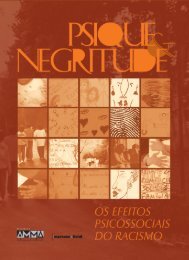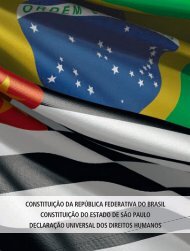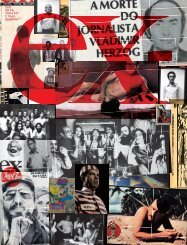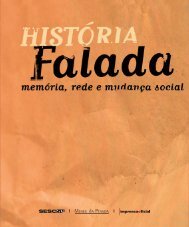CLÁSSICOS BRASILEIROS BRAZILIAN CLASSICS - Imprensa Oficial
CLÁSSICOS BRASILEIROS BRAZILIAN CLASSICS - Imprensa Oficial
CLÁSSICOS BRASILEIROS BRAZILIAN CLASSICS - Imprensa Oficial
Create successful ePaper yourself
Turn your PDF publications into a flip-book with our unique Google optimized e-Paper software.
Brazilian Classics<br />
A selection of authors with works in public domain<br />
82<br />
MACHADO DE ASSIS<br />
(1839 – 1908)<br />
Born in 1839 and died in 1908, Machado de<br />
Assis is the great classic who, harboring all the<br />
western writing tradition, takes the Brazilian<br />
literature to the great and decisive discoveries of<br />
the 20th century. The introduction of an updated<br />
philosophical view led him to break off, still in<br />
the 19th century, with the narrative linearity,<br />
embedding into his work what is fragmentary,<br />
elliptical, and incomplete. While creating an<br />
entirely personal style that was not affected by<br />
any literary school, although pervaded by a fine<br />
pessimistic irony, this novelist, story writer, poet,<br />
playwright, columnist, and essayist combined,<br />
like anybody else before, the balance between<br />
nationality and universality. Going beyond the<br />
romantic view that sought for an authentic Brazil<br />
by incorporating the Brazilian landscape and<br />
explicitly non-European elements, Machado de<br />
Assis wins definitive autonomy for the Brazilian<br />
fiction by privileging an urban landscape, whose<br />
characters are full of ambiguities and insoluble<br />
contradictions. Starting from local themes,<br />
unveiling reality in its raw and non-rhetorical<br />
aspect, he became a writer tuned with his time<br />
and yet atemporal, national and yet universal ...<br />
ultimately, one of the greatest in the world.<br />
Review<br />
Main works<br />
Excerpt<br />
Posthumous memoirs of Brás Cubas<br />
As a matter of fact, one morning, as I walked in<br />
the villa, an idea got hung on the trapeze I used<br />
to have in the brain. Once it got hung, it started<br />
to wave the arms, to stamp the feet, to caper<br />
in the boldest leaps one can possibly believe. I<br />
was just there watching it. In all of a sudden, it<br />
sprang up in a great jump, extended the arms<br />
and legs and took the shape of an X: make out<br />
my meaning or I'll eat you. This idea was nothing<br />
less than the contrivance of a sublime medicine,<br />
an anti-hypochondriac poultice, concocted to<br />
bring a relief to our melancholic humankind<br />
[...]. However, I didn't conceal from my friends<br />
the financial advantages that could result from<br />
the distribution of a product with such sizeable<br />
and deep effects. But now, as I come here to this<br />
other side of life, I can admit everything: what<br />
influenced me most was the gratification of seeing<br />
these three words printed in the newspapers,<br />
display cases, pamphlets, corners, and eventually<br />
in the medicine boxes: Brás Cubas' Poultice.<br />
Why should I deny it? I had a lust for bustle, for<br />
the poster, for the rocket of tears.<br />
From deep Brazil to urban and modern roughness<br />
"Machado de Assis travels the difficult road from deep Brazil to urban roughness. [...] The wizard from Cosme Velho, as<br />
he was often called, in a way to link him to the name of the neighborhood in Rio de Janeiro where he lived his last years,<br />
a partisan of dilemma or enigma, he anticipated the suspicion, the double-dealing, the multiplicity, such modem city<br />
emblems."<br />
(Eduardo Portella, "Machado de Assis, Cronista do Rio de Janeiro")<br />
The contemporaneity of ambiguity<br />
His technique consists essentially in hinting at the most amazing things in the whitest way; or in establishing a contrast<br />
between social normality of facts and its essential abnormality; or in suggesting, under the disguise of the contrary, that<br />
the exceptional action is normal, and that the commonplace would be abnormal. This is why he is modem, in spite of the<br />
archaism in the surface."<br />
(Antonio Candido, "Esquema de Machado de Assis")<br />
Contos fluminenses (1869); A mão e a luva (1874); Helena (1876); laiá Garcia (1878); Memórias póstumas de Brás Cubas<br />
(1881); Papéis avulsos (1882); Quincas Borba (1891); Várias histórias (1896); Dom Casmurro (1899); Poesias completas<br />
(1901); Esaú e Jacó (1904); Memorial de Aires (1908).









